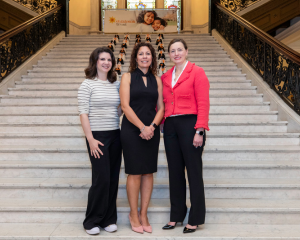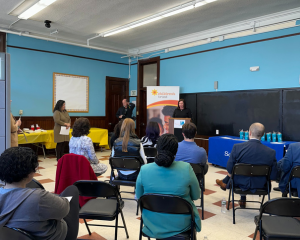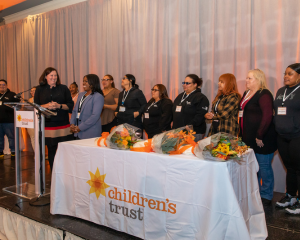Becoming a Dynamic Group Facilitator: Best Practices for Family Support Professionals
Length: 6 hours
The strongest group facilitators are prepared, organized and ready for anything that may come their way; from comforting upset participants, to problem-solving transportation challenges to no electricity in the room. However, becoming a strong facilitator can be scary for many of us. This interactive workshop provides participants with competency-based strategies and tools that when practiced and applied, will help them shape and guide groups to be effective and rewarding. Utilizing best practices from the field of family support and research, participants will identify their strengths and areas of growth as they develop skills that can be used in facilitating parent groups and professional meetings.
Preventing Child Abuse and Neglect: Understanding and Responding
Length: 6 hours
This workshop provides family support and early education and care professionals with the information to understand, recognize and respond effectively to situations in which children may be at risk for abuse and neglect. It will provide an understanding of the different forms of child maltreatment and its impact on children. A major emphasis of the workshop is to identify ways that family support and early education and care programs and staff can support the development of protective factors in families that are effective in preventing child abuse and neglect as well as enhancing the optimal development of children. The different forms of child maltreatment (neglect, physical abuse, emotional abuse, and sexual abuse) are described and participants explore ways to enhance the safety of children while supporting families when these situations exist. Finally, participants explore their roles as mandated reporters. A special emphasis is placed on how to remain connected and supportive to families in situations where a referral to protective services is necessary.
first connections: the importance of attachment and nurturing
length: 3 hours
Attachment is a deep enduring relationship between caregivers and children that starts at birth and shapes all future development. Helping parents understand this bond and supporting the development of attachment with their children is a critical job of family support professionals. In this workshop participants will learn why attachment is important, how it shapes development, and styles of attachment. Developing and sharing activities to promote attachment in infants and toddlers will be discussed.
Getting Grounded in Supervisory Practice
Length: 12 hours (2 full days)
This two-day workshop provides a forum for newer supervisors to reflect on their early supervisory experience and ground themselves in principles and practices of effective supervision. The primary purpose is to provide participants with a sound framework for the provision of family support supervision from a strength-based perspective. Topics will include: Changing roles, job tasks and sources of job satisfaction, the supervisor’s new “place” within the organization, four organizing supervisory roles, structuring supervisory sessions, supporting worker job performance through ongoing supervision and performance evaluation, key elements of the supervisor/family support worker relationship and incorporating strength-based and solution-focused principles into supervisory practice.
How to Incorporate Spirituality into Family Support Practice
Length: 6 hours
Savvy family support providers use all the ethical tools at our disposal. However, many of us neglect the powerful motivation that a parent’s religious or spiritual beliefs can provide to encourage successful parenting. This is sometimes due to misunderstanding legal and ethical concerns or because we are uncomfortable with the topic. This workshop explains how to speak with a client about his or her faith in a way that is culturally competent; it examines how to leverage a client’s beliefs to improve parenting and provides tips for partnering with faith-based organizations to support parents.
Infant and Toddler Development: What the Research is Telling Us
Length: 3 hours
This is an exciting time in the world of early brain research and development. This workshop looks at some of this important research in the field of infant and toddler development. Different developmental systems will be explored, with an emphasis on attachment and the impact early caregivers have on early and later development. Trainees will share strategies on how family support professionals can use an understanding of child development to build protective factors and strengthen families with the youngest children.
Self Care: Coping with Stress and Transitions
Length: 3 hours
Family support professionals cope with a number of challenges every day. This workshop examines the critical need for staff to take care of themselves, not only to protect their own physical and psychological health, but to also better serve families who themselves face challenges and stress. Types of stress and stress reduction techniques will be examined, as well as ways to create a supportive environment to help families and staff reduce stress, especially during times of transition. The concept of mindfulness will be introduced and self care resources will be shared for trainees to use after the workshop.
Trauma-Informed Family Support Practice
Length: 6 hours
This training is designed for those working with children and families who have experience traumatic stress. It draws on current research about trauma and its impact on the development and life experience adults and children. Best practices that support effective trauma-informed practice, programmatic, and policy approaches are explored. An appreciation for how diversity impacts how a person gives meaning to traumatic events as well as coping strategies that can be called on are discussed. The importance of cultural competence in providing trauma-informed services is emphasized. Finally, the potential impact of working with families impacted by trauma on helping persons is explored. The concepts of vicarious trauma and compassion fatigue are explained and participants are encouraged to work toward positive outcomes identified with the terms vicarious resilience and compassion satisfaction.
Standards of Quality for Family Strengthening and Support Certification Training
Length: 6 hours (full day)
The training focuses on how 9 Principles of Family Support and Strengthening Families Approach, with its 5 Protective Factors, can be applied together to enhance work families. Participants are encouraged to come as a team with Executive Directors, Managers, Coordinators, and Direct Service Staff, as each has a key role to play in implementing the Standards effectively. The vision is the implementation of the Standards will help ensure that families are supported and strengthened through quality family support practices.
The Standards of Quality are organized into 5 sections:
- Family Competencies
- Family Strengthening
- Embracing Diversity
- Community Building
- Evaluation
Visit our training calendar to see the upcoming training schedule or email Rayna Charles, Director of Family Support Training & Parent Education.








